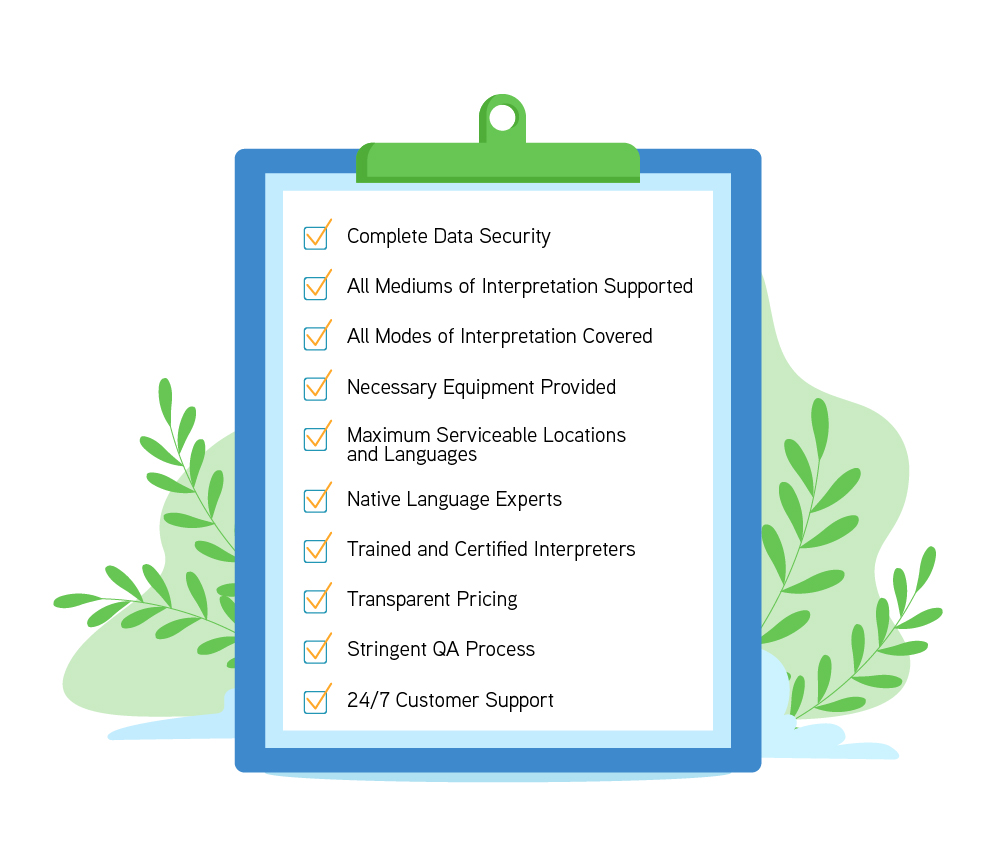Access to medical interpretation isn’t just an additional option for patients that speak a foreign language; in many countries, it is their legal right. For patients who have limited language proficiency, it becomes imperative for healthcare providers to ensure the patient’s well-being by appointing a medical interpreter.
It’s often argued that a bilingual friend or family member can help bridge the communication gap between the patient and the healthcare provider. Unlike trained medical interpreters, however, most people lack the qualifications to help them maintain accuracy, cultural sensitivity, and objectivity, especially when dealing with someone they are emotionally connected to.
Finding interpreters that ensure an unbiased and accurate representation of all information exchanges between individuals and healthcare facilities is challenging. Fortunately, a language service provider (LSP) specialising in interpretation services can help lessen the burden. Here’s everything you should look out for a while scoping the market for the right medical interpretation service:

Complete data security
Information related to a person’s health is extremely sensitive and therefore, must always remain confidential. LSPs that go the extra mile to secure their clients’ health information will adhere to the standards set forth by governing bodies in their areas of operation. In the United States, the Health Insurance Portability and Accountability Act (HIPAA) establishes certain standards of protection while handling protected health information (PHI) in physical or electronic form. It ensures that healthcare providers and their business associates adopt the necessary safeguards to mitigate data mishandling, theft, and breach of confidentiality.
Always look for a service provider that can vouch for complete data security on behalf of their company and all their associates.
All mediums of interpretation supported
There are two main ways to deliver interpretation services; in-person and remote. In-person medical interpretation requires the interpreter to be present on-site, whereas remote medical interpretation can take place via phone or video conferencing. Although in-person interpretation is always preferable, we’ve seen many instances and some very recent ones during the COVID-19 pandemic where it is practically impossible for patients to be in contact with more people than necessary.
The ideal service provider should offer both types of interpretation services and help you make an appropriate choice.
All modes of interpretation supported
There are six modes or ways an interpretation service can be carried out. Some modes require special skills or fluency in multiple languages. A good interpretation service partner will have a team of experts that can adapt to any mode of interpretation. Here are the 3 commonly used modes for medical interpretation that you should ensure your language partner specialises in:
- Consecutive interpretation: Used in large gatherings where a speaker addresses the audience and then pauses for the interpreter to speak.
- Sight interpretation: Where a document is interpreted, and the message is delivered in a language different from the original.
- Liaison interpretation: Most suitable for meetings between two parties that speak different languages. The interpreter is fluent in both.
Necessary equipment provided
Certain modes, such as simultaneous interpretation, require considerable hardware for carrying out the service.
Imagine a convention with a diverse group of professionals from the medical fraternity. Here, a speech delivered in English may need to be interpreted in multiple languages in real-time. An interpreter for each target language would be seated in a soundproof booth, repeating what the speaker is saying within 30 seconds of it being said. The interpretation would be transmitted through headphones to each corresponding member of the audience that speaks the target language.
For such services, it’s essential to establish who will be responsible for the equipment required for the service. A service provider that can guarantee to meet your logistical requirements will save you a considerable amount of time and energy.
Moreover, when it comes to remote medical interpretation services, keep in mind that a consistent and fast internet connection is crucial, as is a high-quality device through which the audio and video will be transmitted. Work with your project manager to iron out concerns like a sudden loss of power or a poor connection during an interaction.
Maximum serviceable locations and languages
A medical emergency can occur anywhere and at any time. When you begin working with an LSP, you need to first check which languages they support and if there are any locations they cannot service. The last thing you want is to be turned down during a crisis.
With in-person interpretation, there are several factors at play. You will see a higher likelihood of success with common languages during working hours in well-connected locations. When any of those variables change, delivering the service can become more complex.
It’s important for you to assess your requirements and have an open conversation with potential partners, so neither party is caught off guard.
Native language experts
The true potential of an LSP can be measured by its network of interpreters. Choosing one that hires only native language experts should be high up on any healthcare provider’s list of requirements. This will ensure that the interpreters assigned to your project can process cross-linguistic differences, understand the cultural background of the patient, and can connect with the individual on a level that most non-native speakers cannot.
Interpreters with the right accents and dialects
Every language is spoken in different regions of the world but can be distinguished by accent. For instance, Canadians pronounce French words uniquely, and hence, there is a dialect of French called Canadian French.
So, if a French interpreter from France were to interpret for a Canadian person, chances are that there would be communication gaps. Moreover, in some modes of interpretation, like remote simultaneous interpretation, the interpreter will have to interpret the message immediately – leaving them no room for adapting their accent or dialect to that of the listener(s).
Trained and certified interpreters
The difference between being trained and being certified is vast when it comes to medical interpretation. Several training programs are available for medical interpretation; however, an interpreter’s competency can only be ascertained through a valid certification.
Medical interpreters should have a background in medicine or be thorough with medical terminology in their source and target language. In countries like the US, an LSP will only hire interpreters that have completed 40-60 hours of medical interpretation training and have qualified for certification from the Certification Commission for Healthcare Providers (CCHI) or National Board of Certification for Medical Interpreters (NBCMI).
Transparent pricing model
Pricing of medical interpretation is dependent on numerous factors such as the language pair, type and mode of interpretation, time and place, etc. That being said, you should know if there are any fixed operational charges or project management fees. You should also ascertain how you will be charged – per day, per hour etc. A clear conversation that maintains transparency will help avoid billing discrepancies in the future.
Be mindful of companies that charge hidden fees or add last-minute fees for equipment rentals or other operational costs.
Stringent QA process
Unlike medical translation, it isn’t possible for a project manager to assess or review the actual work the interpreter does before it reaches you. The company should, however, screen interpreters based on their previous work, qualifications, and references before selection. Similarly, your project manager should also ask for detailed feedback once the project is complete.
An LSP with an ISO certified quality process will ensure that it upholds or exceeds the industry standards.
24/7 Customer Support
Lastly, around-the-clock support should be an integral aspect of your partnership with a suitable LSP. As discussed earlier, emergencies can happen at any time, so the requirement for a medical interpreter can arise even outside of regular working hours. Being able to contact your LSP at any time of the night or day will ensure that there is never a pause in the services you provide.
Conclusion
Medical interpretation, when delivered right, helps save thousands of lives, boosts medical advancements, and allows patients and healthcare workers to feel connected. Take the necessary time and steps to find an appropriate service provider that meets the criteria mentioned above to provide quality medical interpretations.


